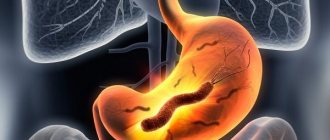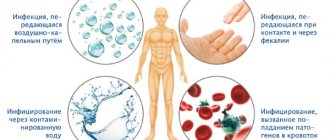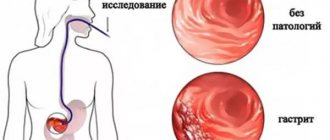A healthy gastrointestinal tract allows every person to fully enjoy life, since it is with food that many people truly enjoy the taste of their favorite dishes. And when stomach problems begin, unpleasant symptoms such as heaviness, nausea, bloating, and heartburn may occur throughout the day.
To prevent the occurrence of serious diseases in the form of ulcers, pancreatitis, gastritis, it is necessary to carry out stomach prophylaxis. If you ignore it, you may soon end up in a hospital ward, since a malfunction in the gastrointestinal tract disrupts the normal functioning of other organs.
Causes of gastrointestinal inflammation
The stomach usually becomes inflamed due to:
- unbalanced diet;
- eating disorders;
- consumption of fast foods, hot spices;
- lack of fresh fruits and vegetables in the diet;
- taking medications;
- weakened immune system.
Eating fatty foods and fast food containing preservatives and chemical additives, irrational combinations of foods, poor lifestyle and bad habits have a negative impact on the body and lead to dysfunction of the digestive system.
Any disease associated with the stomach causes discomfort, as it is often accompanied by severe pain. Ignoring warning signs can result in death. Even ordinary gastritis does not need to be started, as it will quickly develop into an ulcer.
Preventive measures that children and adults should adhere to will help reduce the risk of developing the disease.
Gastritis of the stomach prevention
The main principle of preventing gastritis is following the rules of personal hygiene and organizing proper nutrition. It is necessary to take care of the completeness of the diet - do not starve, but also avoid overeating, refuse fast food on the go and dry food.
Give preference to fresh products, do not store them for a long time to avoid contamination by bacteria and microorganisms. Thoroughly wash all berries, fruits, vegetables, herbs, eggs, raw meat and fish under running water before cooking, and also follow the rules for storing food separately in the refrigerator.
Individual prevention of exacerbation of gastritis also involves eliminating foci of infection. Moreover, we are talking not only about the treatment of acute infectious diseases, but also about chronic processes such as sinusitis, tonsillitis, cholecystitis, pancreatitis, hepatitis, colitis, tuberculosis or caries. It is also important to take care of relieving neuropsychological tension using non-medicinal means, learning to overcome stressful situations, and avoiding depression, excessive fatigue and lack of sleep, because all this directly affects the functioning of the stomach.
Regular medical examination using instrumental examination methods and following the gastroenterologist’s prescriptions are very important. Treatment courses should be repeated in spring and autumn to prevent relapse. It is necessary to pay attention to the identification and treatment of all concomitant diseases of the gastrointestinal tract, cardiovascular and endocrine systems, acute infections, and various pathological conditions that are not directly considered diseases.
Long-term use of medications that irritate the gastric mucosa or, conversely, suppress the secretion of gastric juice, should not be allowed. Take any medications strictly as prescribed by your doctor, without self-medicating or using the advice of traditional medicine - this should become an unshakable rule for all those suffering from gastrointestinal disorders.
Regular medical examination is very important for gastritis.
Avoid occupational hazards to avoid toxic or irritating effects on the stomach. This includes work in hot shops, inhalation of silicate, cotton, coal and metal dust, and absorption of alkali vapors and fatty acids in the process of soap making, candle production, margarine production, painting work, etc.
Primary prevention of gastritis
Primary prevention is aimed at preventing the disease. This is facilitated by maintaining immunity, creating favorable living conditions, including good nutrition 4-5 times a day, physical activity, sports, a positive psycho-emotional state, sound sleep 7-8 hours a day.
It is very important to monitor your health, treat any diseases in a timely manner, carefully maintain oral hygiene and regularly visit the dentist. Considering the extreme prevalence of Helicobacter pylori, it is necessary to take care to exclude the possibility of infecting your body with this spiral-shaped bacterium, which lives on the gastric mucosa, attaching to the villi of the epithelium. In 80% of cases, it creates conditions for the development of peptic ulcer disease. A test for antibodies to Helicobacter pylori can now be taken in some private laboratories to refute or confirm its presence.
This is especially true for those who live or work in close proximity to carriers of this infection. For example, if someone in your family has already been diagnosed with peptic ulcer disease, you need to constantly adhere to preventive measures. So, you should not share the same cutlery, dishes, or towels with the patient. You should also refrain from kissing to reduce the likelihood of transmitting the infection to healthy family members, especially children.
Secondary prevention of gastritis
Secondary prevention of gastritis involves a course of Helicobacter pylori eradication, which is mandatory for all Helicobacter pylori-positive patients with chronic gastritis.
Prevention of exacerbations of reflux gastritis involves multiple meals in small portions (5-6 times a day), exclusion of overeating and causes that may be accompanied by an increase in pressure in the abdominal cavity (constipation, flatulence, tight belts, significant physical activity accompanied by muscle tension in the anterior abdominal wall ).
Secondary prevention of gastritis involves a course of Helicobacter pylori eradication
Patients are recommended sanatorium-resort treatment with the use of mineral waters, nutritional therapy, balneo- and climate therapy, and physiotherapeutic methods of treatment. Patients with gastritis need clinical observation with preventive examinations 2 times a year, selection of treatment and determination of further tactics for the use of therapeutic measures.
Prevention of gastritis with folk remedies
To prevent gastritis, it is important for people with gastrointestinal diseases to follow a diet. Fried, salted, smoked dishes and canned food are excluded from the diet. For breakfast, it is advisable to eat well-cooked oatmeal, semolina or rice porridge. To start the digestion process and protect the stomach mucosa from external factors, it is useful to drink a glass of warm water with the addition of honey on an empty stomach.
An effective way to prevent gastritis and many other diseases is rosehip decoction. The berry is a leader in vitamin C, iron, and magnesium content. These elements are important for the smooth functioning of digestion and protection against microbes. For 1 liter of water take 3-4 tablespoons of fruits. To preserve its beneficial properties, rose hips are dipped in water brought to a boil. After boiling, reduce the heat to minimum. Rose hips are placed when there are no bubbles on the surface. Preparation time for the decoction is 30 minutes. After this, the drink is covered with a lid and left to steep for an hour. The healing decoction is drunk between meals.
source
Prevention of stomach and high acidity
To normalize the functioning of the gastrointestinal tract and eliminate high acidity, you should know what to take for preventive purposes.
Almagel
The medication is produced in the form of a suspension; it is recommended to drink for ulcers, gastritis, heartburn, stool problems, and severe pain.
You can take it periodically half an hour before meals. The dosage, depending on age, varies from 5 to 15 ml.
Gevikson
Available in powder or suspension form. For preventive purposes, take 15 ml after meals no more than four times a day. The drug should not be used for more than ten days of continuous use.
Gastal
The medicine may have various flavorings; the tablets are sold in packages. Take one tablet after meals four times a day. Treatment should not exceed more than two weeks.
Rennie
Absorbable tablets should be taken no more than three times a day if heartburn bothers you or if there is discomfort in the stomach. The medication can be used for ten days.
Maalox
The dosage of the suspension is 15 and 30 ml. Maalox is taken one hour after meals. If heartburn occurs, you can drink it immediately. Continuous use of the drug should not exceed one month.
Prevention of gastrointestinal diseases primarily restores the acid-base balance. Along with taking medications, it is not a bad idea to stick to a diet.
Alcoholic drinks, caffeine, soda, and foods containing salt and vinegar should be excluded from your daily diet. During the period of following the diet, which should last at least one month, you need to:
- have a good breakfast;
- eat vegetable soup for lunch;
- For dinner you can cook meat or stew vegetables.
The daily nutritional intake should include 4 to 5 meals. You can consume dairy products whose fat content does not exceed 3%.
Prevention of gastritis of the stomach with drugs and folk remedies
Everyone knows that any disease is better to prevent than to treat. This also applies to gastrointestinal diseases. Preventing gastritis of the stomach is not as difficult a task as it seems at first glance. Prevention of gastritis is divided into primary and secondary, and each type includes various measures. There are special medications for the prevention of chronic gastritis. Well-known remedies for the prevention of gastritis are Omez and De-nol, but you should know how to use them correctly. Prevention of exacerbation of gastritis also plays an important role.
Prevention and treatment of gastritis
Gastritis is an inflammatory process that results in destruction of the gastric mucosa. The consequence can be dysbacteriosis if it is not treated. The disease requires adherence to a strict diet and medication, which must be prescribed by the attending physician.
Orthanol
The drug is taken for twelve days, up to two capsules per day. It is characterized by cumulative actions.
For prevention purposes, it is worth excluding from your daily diet foods that cause irritation to the stomach and mucous membranes. You need to take boiled or steamed food. You should also protect yourself from nervous and stressful situations, avoid mental disorders and depression.
Omeprazole
The medication helps eliminate abdominal pain and discomfort. The dosage of the drug is prescribed taking into account the form of gastritis:
- with a mild form, the medicine is taken for one to two weeks;
- in the case of the chronic stage, you need to drink one capsule per day for one month;
- if an exacerbation is observed, the medication can be increased to three capsules per day strictly as prescribed by a specialist.
Prevention of gastritis
Prevention of gastritis is a set of measures aimed at preventing inflammatory changes in the gastric mucosa. It includes the fight against any types and forms of this disease. Some specificity and division of preventive measures occurs for two types of gastritis: acute and chronic. This is due to fundamentally different pathogenetic mechanisms of their occurrence.
Memo for patients with chronic gastritis
Gastritis appears only in cases where the stomach is affected by any irritating factors. Therefore, it is necessary to minimize their impact. If the prevention of gastritis is carried out correctly, then the disease will not bother a person.
After the main treatment is completed, it is advisable for the patient to engage in gentle physical activity. All exercises must be selected taking into account the capabilities of a particular person. Particular attention should be paid to the oral cavity. Daily brushing of teeth, as well as their timely sanitation, will prevent the appearance of pathogenic microflora in the stomach cavity.
For chronic patients, you should be extremely careful in the autumn-spring period. Because it is at this time that the risk of relapse increases. A preventive examination by your attending physician and treatment with anti-relapse drugs will allow you to avoid the acute form.
Memo for patients with chronic gastritis:
- maintain a diet;
- adhere to a gentle diet;
- reduce or eliminate smoking and alcohol consumption;
- eliminate helminthic infestations;
- do not eat foods of questionable quality, as well as food that can damage the gastric mucosa;
- avoid occupational hazards: contact with dust, vapors of acids and alkalis, etc.;
- regularly brush your teeth and monitor the condition of the oral cavity, sanitize in a timely manner;
- reduce the use of medications that irritate the stomach;
- promptly treat diseases of the nervous, endocrine and cardiovascular systems.
In addition to all of the above measures, sanatorium-resort treatment is recommended for all patients with chronic gastritis.
Sources:
- https://kostcrb.by/xronicheskij-gastrit/
- https://otherreferats.allbest.ru/medicine/00223811_0.html
- https://evrazmed.ru/
Problems of a patient with chronic gastritis
Chronic gastritis is a widespread disease of the digestive system, which affects about 20-30% of the entire adult population in different countries of the world. As a result of prolonged exposure to damaging factors, the mucous protective barrier of the stomach is disrupted, inflammatory processes develop, and regeneration and blood supply to the mucous membrane are disrupted.
Over time, this leads to a restructuring of the gastric epithelium according to the intestinal type. The clinical picture of chronic gastritis is characterized by a number of local and general symptoms, and also depends on the type of chronic gastritis. Without consulting a doctor in time, a person risks encountering problems in the form of complications of the development of diseases such as gastric ulcers, gastric bleeding, stomach cancer, and peritonitis.
Problems of patients suffering from gastritis: gastric discomfort, epigastric pain
Problems of patients suffering from gastritis: gastric discomfort, epigastric pain, changes in appetite, belching, heartburn, nausea, vomiting, weight loss, etc. Potential problems: gastric bleeding, fear of complications (cancer, peptic ulcer). .
Chronic gastritis type A patient problems
This form is most often found in older people. Patients with this type of gastritis have problems in the abdomen and problems with the sense of taste in the mouth. Patients complain of pain, a feeling of heaviness, pressure in the epigastric region after eating, belching of rotten air, a feeling of early satisfaction of hunger, loss of appetite, nausea, and an unpleasant taste in the mouth.
Even stool disorders in the form of diarrhea, flatulence, and rumbling in the stomach are typical. Upon examination, attention is drawn to pallor of the skin and mucous membranes, dry skin, redness of the gums, and smoothness of the tongue. On palpation, diffuse pain is noted in the epigastric region.
Chronic gastritis type B patient problems
With chronic gastritis type B (Helicobacter), the patient’s problem is that the disease is manifested by hunger and night pain in the epigastrium, nausea, vomiting, sour belching, and heartburn. The stool tends to be constipated.
An objective examination reveals pain in the epigastric region with deep palpation. Problems with the tongue are possible - the tongue becomes covered with a white coating, and teeth marks appear on the side surfaces.
Priority problems of a patient with chronic gastritis
In chronic gastritis, along with inflammatory changes in the mucous membrane, dystrophic changes are observed. In advanced cases, atrophic changes in the mucous membrane are observed, with damage to the gastric glands, which leads to a sharp decrease in the secretory function of the stomach.
The priority problem for patients with chronic gastritis is pain in the epigastric region. Often stomach pain intensifies between meals. Taking any aggressive liquids, medications, or food shortly before a painful attack is a sign of gastritis.
The chronic form of gastritis occurs without noticeable manifestations or its manifestations are erased. These may be: belching, bad breath, barely noticeable pain in the stomach, which patients usually do not pay attention to, a feeling of heaviness in the stomach. Indigestion, frequent bowel movements, and constipation may also be evidence of an inflammatory process in the gastric mucosa.
Chronic gastritis can cause significant damage to the stomach lining and cause serious illness
What is gastritis
Gastritis is an inflammation of the stomach lining. This is a very common disease. Currently, there are different types of gastritis: with high and low acidity, erosive, allergic, etc.
The disease affects not only the mucous membrane. A number of other changes are taking place in the work of the body. The activity of the glands is disrupted, they cannot produce an adequate amount of juice: there is too much or too little. The secretion may contain an increased or decreased amount of hydrochloric acid. As a result, food absorption deteriorates and the stomach cannot cope with its digestion. Cell regeneration processes are also disrupted.
Why does he appear
To understand how to prevent gastritis from occurring, you first need to understand why it occurs. There are few main causes of inflammation of the gastric mucosa. Basically, they are all associated with poor nutrition or the use of any aggressive drugs or drugs. Thus, acute gastritis most often occurs after food poisoning or long-term use of medications.
The chronic form of the disease develops with constant nutritional disorders: overeating, consumption of low-quality foods, lack of a regimen, etc. In addition, the bacteria Helicobacter pylori can also be the cause.
There are a number of factors that contribute to the development of the disease, but not directly, but indirectly, for example, lack of daily routine, lack of sleep, low or excessive physical activity, smoking, etc.











